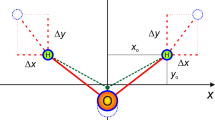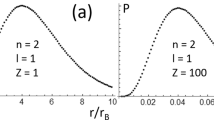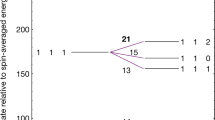Abstract
THE analysis of the band spectrum of helium is now nearly complete. The great majority of the stronger lines have been allocated to bands, of which some sixty have now been recognised. The remaining lines may be attributed to (1) higher members of the electronic sequences already known, (2) electronic levels of a new type, and (3) vibrational levels.
Similar content being viewed by others
Article PDF
Author information
Authors and Affiliations
Rights and permissions
About this article
Cite this article
CURTIS, W., HARVEY, A. Properties of the He2 Rotation Terms. Nature 124, 12 (1929). https://doi.org/10.1038/124012a0
Issue Date:
DOI: https://doi.org/10.1038/124012a0
This article is cited by
Comments
By submitting a comment you agree to abide by our Terms and Community Guidelines. If you find something abusive or that does not comply with our terms or guidelines please flag it as inappropriate.



